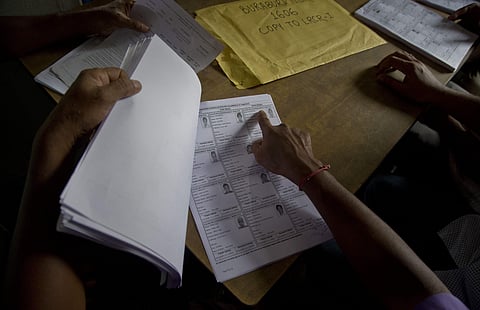

GUWAHATI: Assam Public Works (APW), the original writ petitioner in Supreme Court for NRC in the state, Monday demanded a high-level probe into alleged corruption by the previous state NRC authority in the updation of the citizens' register.
In a memorandum to the new state coordinator of National Register of Citizens (SCNRC) here the APW also petitioned for a third-party audit by an internationally acclaimed organisation into the functioning of the software, application and IT infrastructure utilised in the process of preparing the NRC.
A delegation of APW led by its president Aabhijeet Sharma met the new NRC state coordinator and submitted a memorandum said the final list was much below the expectation of the people of Assam to get a flawless NRC.
He said the Assam rights group has been raising vital points to be clarified by the authority since the draft NRC was first published in December 2017.
The memorandum claimed that hundreds of software were used in updating the NRC and "as per information it seems that most of the software were put into verification work without any test whatsoever leading to serious malfunction. It ultimately resulted in wrong entries in the NRC".
The memorandum said the APW also suspected manipulation of data which could be deleted only through an IT audit was never done during the NRC updation process.
"The third party quality check done by the then NRC state coordinator was through an agency employed by himself.
It performed as per his direction leaving space for us to question whether the quality check was authentic or not," it said.
Stating that a large number of fake certificates have been detected, the memorandum said these are of no value so far as NRC updation is concerned as most of them are used for the second generation, like in the case of birth certificates.
The memorandum contended "Most of the first generation legacy persons have used the electoral roll as link document, which is not dependable at all".
A legacy person is someone who figures in a set of pre-1971 documents such as the 1951 NRC and voters lists up to 1971, who an applicant can trace his or her lineage to.
The standard operating procedure issued by the Centre during the claims and objections phase said anyone excluded from the NRC draft cannot change the legacy person.
Elaborating, the APW said the normal practise followed by the illegal migrants is to enter their names in the post-1971 electoral rolls assuming to be the offspring of someone whose name figured in the pre-1971 electoral roll as there are no foolproof methods of detecting this fraudulent activity.
Claiming that 'family tree' verification would have been the foolproof method had it been done properly, it said in that method all the offsprings of a legacy person were asked to submit their family details which were compared through the software.
"The family trees of the genuine offsprings match and the family trees of persons who assume a name in the pre-1971 documents as their ancestor do not match with that of the genuine offspring", it said.
But the method did not work properly as almost all the data entry operators at the NRC seva kendras in the immigrant dominated areas were from the immigrant community itself, the APW claimed.
The remuneration received by the operators were a meagre Rs 5,000 per month while the system integrator got around Rs 14,000 per month per operator.
The data entry operators were therefore recruited locally as the low pay was not sufficient for an operator to work from a distant place.
Besides, there was was no police verification of the citizenship of these operators, the memorandum said adding that apart from them almost all local registrars of the Citizens Registration and other verification officers working in the immigrant dominated areas were also from the immigrant community, the memo said.
The APW drew the SCNRC's attention to complaints to the NRC that the verifying officers with the help of the data entry operators, both of whom belonged to the immigrant section, had manipulated the family tree verification to include the names of suspected foreigners in the draft NRC.
The complaint was verified and it was suggested that the family tree verification in the immigrant dominated areas where verification officers and the DEOs are from the immigrant community or one of them were from the immigrant community, should have been cross-verified by another set of officers whose citizenship is beyond doubt, Sharma said.
He also alleged that the verification of the software through which the uploaded family tree data could be checked was not allowed by the previous state coordinator of NRC.
Claiming that corruption was committed by the previous SCNRC with his close aids, The APW contended that the Centre had expended Rs 1600 crore for the procedure through the then NRC Coordinator and urged the new SCNRC to enquire into the whole process "because a large number of illegalities, financial irregularities have been committed in making various expenditures" by the previous incumbent.
Hitesh Dev Sarma was appointed the new SCNRC in place of Prateek Hajela in November.
Hajela was transferred to his home state Madhya Pradesh.
The final NRC list was published on August 31, 2019.